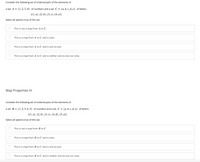
A First Course in Probability (10th Edition)
10th Edition
ISBN: 9780134753119
Author: Sheldon Ross
Publisher: PEARSON
expand_more
expand_more
format_list_bulleted
Question

Transcribed Image Text:Consider the following set of ordered pairs of the elements of
a set A = {1,2, 3, 4} of numbers and a set C = {a, b, c, d, e} of letters.
{(1, a), (2, b) , (3, c) , (4, e)}
Select all options true of this set.
This is not a map from A to C.
This is a map from A to C and is onto.
This is a map from A to C and is one-to-one.
This is a map from A to C and is neither one-to-one nor onto.
Map Properties IV
Consider the following set of ordered pairs of the elements of
a set B = {1,2, 3, 4, 5} of numbers and a set C = {a, b, c, d, e} of letters.
{(1, a), (2, b) , (3, c) , (4, d) , (5, a)}
Select all options true of this set.
This is not a map from B to C.
This is a map from B to C and is onto.
This is a map from B to C and is one-to-one.
This is a map from B to C and is neither one-to-one nor onto.
Expert Solution
This question has been solved!
Explore an expertly crafted, step-by-step solution for a thorough understanding of key concepts.
Step by stepSolved in 2 steps with 2 images

Knowledge Booster
Similar questions
- Consider the relation R = {(1, 1), (1,3), (2,4), (3, 1), (3,3), (4, 3),(4,5)} on the set A = {1,2,3,4,5,6}. Find the Symmetric and reflexive closure.arrow_forward6. If A = {1, 2, 3} and B = {2, 3, 4}, and R is the relation xRy when x + y is divisible by 3, then R = O {1, 2), (2, 4)} all of these O {(1, 2), (2, 4), (3, 3)} O {1, 2), (3, 3)}arrow_forwardR= {(1,2), (1,3), (1,4), (2,3), (2,4), (3,4)} is a relation on the set A = {1, 2, 3, 4}. 3.a. Show the digraph of R. 3 b. Show the matrx of R. 3.c. Determine whether R is reflexive, symmetric or transitive. You must give reasons for these answers. 100%arrow_forward
arrow_back_ios
arrow_forward_ios
Recommended textbooks for you
 A First Course in Probability (10th Edition)ProbabilityISBN:9780134753119Author:Sheldon RossPublisher:PEARSON
A First Course in Probability (10th Edition)ProbabilityISBN:9780134753119Author:Sheldon RossPublisher:PEARSON

A First Course in Probability (10th Edition)
Probability
ISBN:9780134753119
Author:Sheldon Ross
Publisher:PEARSON
